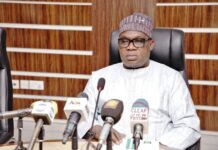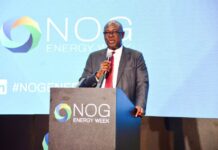
The Ecological Project Office (EPO) has reiterated the need for increased funding for its intervention projects, stating that the present accruals to the office is grossly inadequate to address the barrage of requests by communities for interventions.
Speaking today at the One-Day Public hearing on gully erosion, perennial flooding and desertification in communities in Nigeria convened by the House of Representatives Committee on Environment, the Director , Overseeing the Office of the Permanent Secretary, Mr Clinton Igwe, said the public hearing is a veritable platform to educate Nigerians on the operations of the office.
The federal government being responsive put in place the ecological fund as an intervention mechanism established in 1981 by the Federation Act was subsequently modified by Decree 36 of 1984, 106 of 1992 as well as the Allocation of Revenue/ Federation Account Modification Order, 2002.
Igwe explained that due to the various misconceptions about the office, the public hearing is important to make necessary clarifications on how the funds are deployed. He said the objective of the fund is to enable government address serious ecological problems across Nigeria and mitigate their impacts.
The overseeing director further highlighted that the Act having passed through some modifications over the years led to adjustments in the sharing formula between the three tiers of government and other sister agencies benefitting from the 2.32 % of the overall ecological fund.
The fund shared through the Federation Account Allocation Committee (FAAC) of which 1% of the 2:32% goes to the Federal Government and 1.32% to the States (0.72 %) and Local Government (0.60%) Meanwhile, the 1% of the Federal Government is further shared between the Ecological Project Office and four other sister agencies, namely: The National Emergency Management Agency (NEMA), National Agency for Great Green Wall ( NAGGW), North-East Development Commission (NEDC) and the National Agricultural Land Development Authority (NALDA).

He posited that despite the dwindling resources accruing to the Ecological Project Office, the federal government has however shown commitment in its intervention efforts. He disclosed that between 2015 to date, the government has implemented a total of 353 projects of which 229 have been completed and commissioned, 72 completed and awaiting commissioning while 31 are at various stages of completion across the country.
In his opening remarks, the Speaker, House of Representatives, ably represented by the Deputy Majority leader, Hon Abdullahi Ibrahim Halims, said, “the public hearing was designed as a veritable platform for participants to express their views on the diverse impacts of gully erosion, flood disasters on several of our communities across the states”.
The law maker also noted that the contributions of stakeholders, “are desired to enable us embark on the right legislative action to tackle these environmental challenges”.
He further explained that the public hearing is to “provide members of the public with a robust window to participate in the parliamentary practice”, adding , “in doing so, your views , feelings, intent and aspirations are accommodated in the legislative framework to guarantee a better output”.
In his welcome address, Chairman, House Committee on Environment, Hon Pondi Julius Gbabogor, commended members and stakeholders for committing to the cause of addressing the ecological challenges in the country. He said the committee had received nine referrals from the House on issues ranging from gully erosion, perennial flooding and desertification in communities in Nigeria and had invited relevant agencies of government to attend the hearing in order to deliberate and proffer solutions that will mitigate the challenges.

Presentations of gully erosion menace at Nkisi Aroli I and Obeleagu Communities of Onitsha North/South Local Government Areas of Anambra State and the flood disaster in White Sand Areas of Alimosho local Government Area, Lagos State were cases in point of the devastating menace of the ecological challenges facing communities. Sponsors for the interventions said urgent and critical interventions were needed to save lives, livelihoods and properties in the affected areas.
Eno Olotu (Mrs) Mnipr
Dep Director, Information and Public Relations




